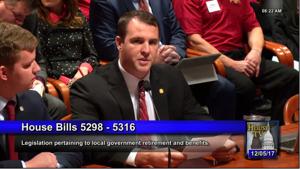State administrators project $1.24 billion tax shortfall for 2020

(The Center Square) – Michigan’s General Fund and School Aid Fund tax revenues dropped $1.24 billion since January 2020, according to figures released Friday by state administrators and fiscal analysts.
The latest state consensus revenue estimating conference also projected an $84 million shortfall for 2021.
State officials, including State Treasurer Rachael Eubanks; State Budget Director Dave Massaron; Senate Fiscal Agency Director Christopher Harkins; and House Fiscal Agency Director Mary Ann Cleary, arrived at the consensus based on revised economic and revenue figures for the remainder of fiscal year 2021 and for the upcoming 2022 and 2023 fiscal years.
For 2023, the conference projects General Fund and School Aid Fund tax revenues at $25.90 billion, compared to $25.51 billion in 2021 and $26.16 billion in 2022.
Michigan House Appropriations Chair Thomas Albert, R-Lowell, declared those projections highly optimistic.
“We’re not out of the woods on the state budget,” Albert said in a statement issued Friday afternoon.
“Revenues look far rosier than the economic reality because revenues are artificially propped up by federal COVID relief, increased unemployment benefits and other temporary measures. It’s wildly unsustainable, and that’s why we must be careful with state spending, and continue to look for ways to make government more effective and efficient,” he said.
“There won’t be a real economic recovery – and the state budget won’t be truly healthy – until our economy is reopened,” Albert continued. “Our governor does not have a clear and transparent plan that is based on public data. Her COVID restrictions remain arguably the harshest in the nation, and Michigan families – struggling to make ends meet – are the ones paying the price.”
Last week, Albert said that Gov. Gretchen Whitmer must reopen Michigan’s economy before the legislature can discuss allocating federal COVID-19 relief funds, drawing the governor’s ire.
“I will continue to work with legislative colleagues to ensure the people of Michigan get the help they need to deal with this pandemic, while also ensuring any future funding does not allow the governor to continue on this path,” Albert said on Friday. “Until the governor stops overstepping her authority, she will have as much input into the budget process as she has afforded the Legislature and the people of Michigan during this pandemic.”
Eubanks noted the COVID-19 pandemic was to blame for the projected shortfalls. However, she added in a statement issued Friday, the state “has outperformed national averages in a number of areas.”
Eubanks credited federal stimulus dollars for both directly and indirectly reducing the revenue shortfalls.
“While still down more than $1 billion compared to before the pandemic, today the state’s revenues were raised upwards primarily due to direct and indirect impacts from the federal stimulus. Our economic recovery this year will continue to depend on the course of the pandemic and the additional economic relief coming from Washington D.C.,” she said.
“There is cautious hope and optimism as we move forward as vaccines are administered, and we begin to put the pandemic behind us.”
Disclaimer: This content is distributed by The Center Square

